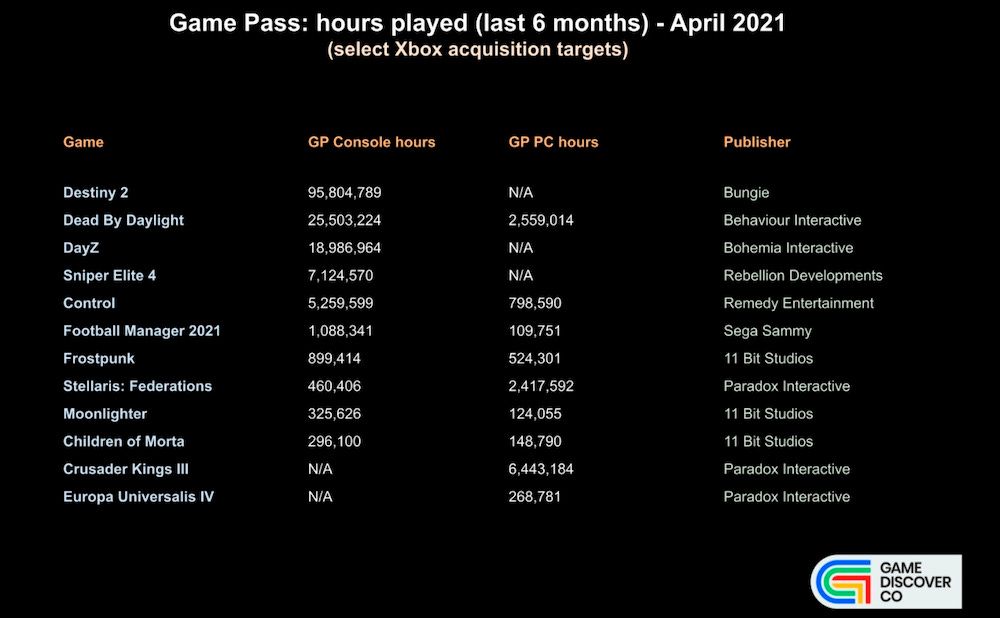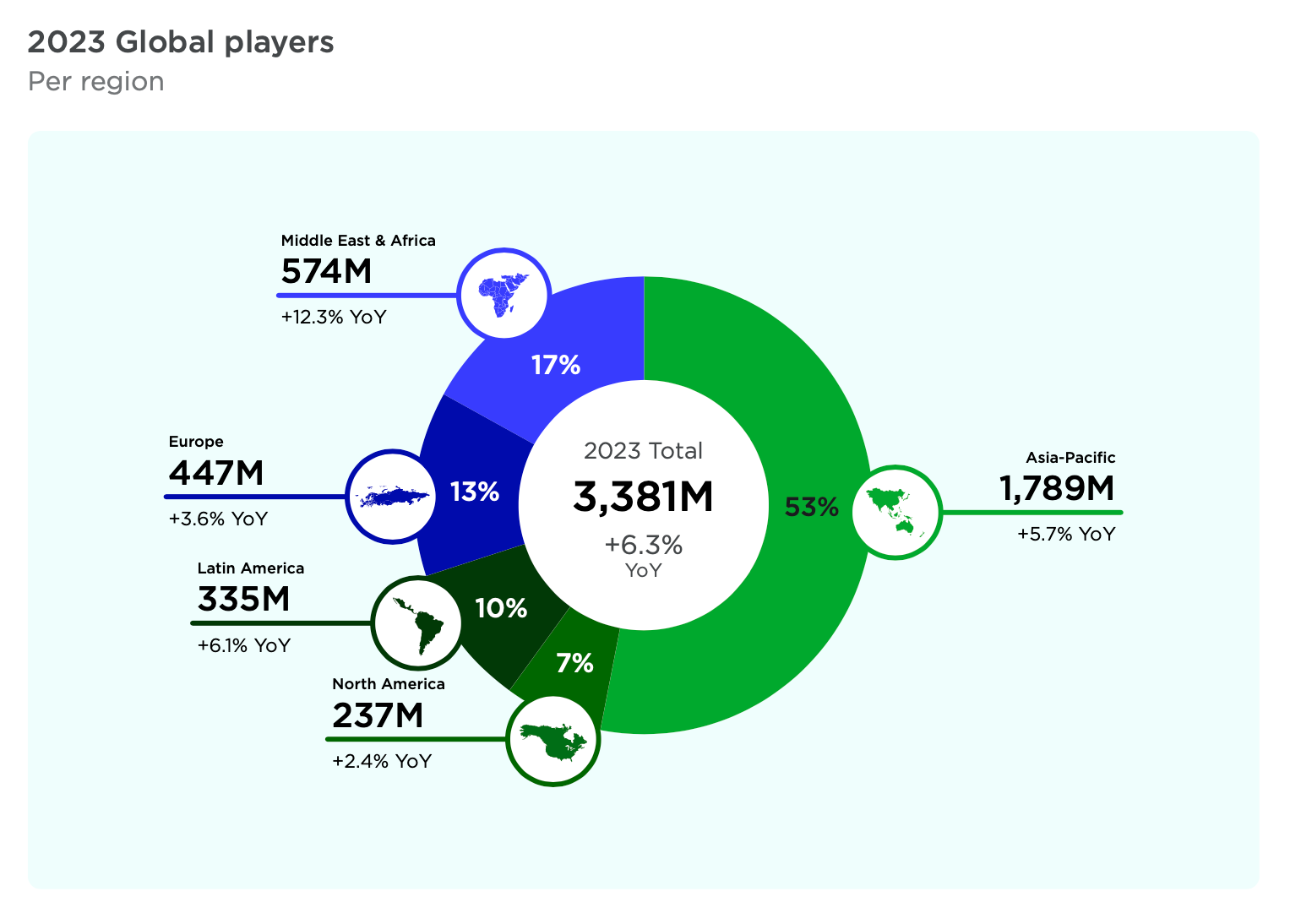Xbox Gamepass players energy consumption & emissions💨🍃Can we put a number on the game industry’s annual GHG impact? Part 3

Alright, it's time to get back to the main game – putting a figure on the total GHG footprint of the games industry. This time we’re interested in those pesky downstream emissions that happen whenever people actually play our games.
For that, we need a couple of pieces of information: how many players there are, where those players are in the world, what device they are playing games on, and how long they play for. Once again, we have only partial answers to these questions, and today we're focussing on just a small slice of that question based on some interesting new data that's recently tuend up.
First, the big picture. Newzoo’s global games market report came out last month, and it delivers the following impressive projection that: “players worldwide will reach 3.38 billion in 2023.”
Breaking down all those players by platform they provide the following figures:
- PC: 892M
- Mobile: 2,856M
- Console: 629M
Of course, that totals to 4.3 billion, because newsflash, lots of players play across multiple platforms! So that’s a complication. We could stop there, however, and make some ballpark guesstimates based on that. We would still need to know an average time played for each platform though. The closest I’ve come to is the chart below, that Simon Carless’ Game Discover Co newsletter (which is great btw) highlighted from a 2021 Xbox document here, revealed during the Activision Blizzard acquisition process: https://drive.google.com/file/d/1KzGdS4B-LcY8ok7u_6880M54ngGzovid/view
Check out those huge hours played per platform numbers:

Those are some wild numbers for Destiny 2 on Xbox (which happens to have been my game of choice over that period; clearly not alone there!) – and we can use that to make some rough estimates of the energy consumed by all those Xboxes over that time.
We have data (from the EU energy efficient games consoles testing process) on the active gaming energy consumption of each of the four main Gamepass-able consoles:
Xbox Series X: 153 watts
Xbox Series S: 74 watts
Xbox One X: 177 watts (as measured by digital foundry)
Xbox One S: 62 watts
There’s also the original Xbox One but that’s a bit long in the tooth, and I’m guessing a lot got replaced by S/Xs? In any case, it has a slightly lower rated PSU than the One X, so I suspect will consume similar power. Lets just fold in Xbox One Vanilla consoles into the One X figures. To avoid me spelling every little decision out, and make it all a bit more comprehensible, it’s time yet again for some Minor Spreadsheet Madness. Go take a nose at it, and if you're really keen, make a copy, and tweak my assumptions about the splits of differeny consoles that make up those hours-played.
I’ve make some assumptions about the split between these four (!!) Xbox console flavours, and between low and high-end PCs and their power consumption, and then multiplied the Gamepass hours-played figures from the image above to get kWh totals by game, and by console type. Then using a (very coarse) planet-wide emissions factor for electricity, some sums, and some multiplication later, we get the following results table (based on my assumptions – again, feel free to tweak to whatever you prefer to assume!):

11 thousand tonnes of CO2 just from six months of Gamepass play! And of that, only the top 12 games! It’s not even the entire Xbox platform! Think of all the players playing games not on Gamepass: the Call of Duty players, the Battlefield players, the Assassin’s Creed players, aaah there’s so many games, so many players.
These numbers are just a tiny fraction of the entire playerbase in the world too. In January '23, Gamepass subscribers allegedly topped 25 million for the first time. That’s not even four percent of the total number of console players Newzoo figured. So take that 11,000 tonnes and multiply it as much as 20x just for 6 months of the console market: or around 440,000 tonnes of CO2 per annum. That seems entirely plausible to me.
This is why, even though in general consoles are higher efficiency than PC, there’s just so many of them with so many hours played that even tiny increases or decreases in watts used by a devices will make huge differences to CO2 over the next few years.
Of course, these are just some very crude estimates – we’re using a world-wide emissions factor, which isn’t going to account for local energy grids and their specific CO2 intensities. What parts of the world are all these millions of gamers in? Newzoo has this a neat illustration, which helps a bit:

A lot of those APAC players are going to be on mobile, but not all of them – and average emissions intensity for power in Asia is one quarter again higher than the world average.
I started trying to use these splits to modulate emissions figures by expected gamers per region, but it’s something I’ll have to come back to (I started working on it in another tab on the spreadsheet linked above). I would love to be able to offer some better insight into emissions intensity by player location, but I think I need more data than this. I bet platform owners would have it though. The AfterClimate contact form is always open to tips and suggestions for data sources, by the way – or you can just hit reply to this newsletter email. Feedback is always appreciated.
The scale of gamer's energy consumption and emissions is also why knowing what sort of electricity your game is demanding from players devices is so important, and figuring out ways to reduce it is going to be such an massive task. Reach out if you’d like to talk about ways you might be able to do that for your next game! I reckon I've got some ideas.
I hope I can get back to take some more bites out of this huge job of figuring out the emissions of gameplay soon. There's still PC, Playstation, Nintendo, and mobile. It’s going to take quite a bit longer than I thought!
Anyway that’s all for now. I’ve had the fortnight from hell just in terms of workloads. From the report I teased a few weeks back (which is getting very close, can’t wait to share it), as well as finalising the Net Zero snapshot, on top of that I moved house this past week, and have all the complications that go along with that. Busy, busy month! October will probably be similar! Thanks for sticking around for it.